US citizenship test to get a MAGA makeover, made tougher to pass
Remembering High School Civics: Passing the naturalization test administered by USCIS is required for all prospective citizens and is typically one of the last steps before being naturalized.
The U.S. citizenship exam is set for a major revamp, with plans to roll out a tougher version, echoing reforms from President Donald Trump's first administration. Joseph Edlow, the new head of U.S. Citizenship and Immigration Services (USCIS), has criticized the current test—where applicants must correctly answer only six out of ten civics questions from a set of 100 which are pre-provided—as overly simplistic, encouraging memorization over meaningful education of American values.
The proposed changes could reinstate a more demanding format, possibly requiring 12 correct answers out of 20 questions, as briefly trialed in 2020. This move has ignited controversy, with opponents warning that it may hinder immigrants, especially those with limited English skills, while proponents argue it fosters a deeper understanding of U.S. governance, history and its values.
Immigrant advocates fear that the revised test could unfairly impact groups like refugees, seniors, and individuals with disabilities. A 2022 pilot program that tested a multiple-choice format and added an English-speaking component, where applicants described images, was abandoned in December 2024 after over 1,300 public comments flagged concerns about increased complexity and barriers for those with lower literacy. For now, the 2008 test version persists, but the drive for a more rigorous exam reflects stricter immigration policy changes under the Trump administration.
Stricter scrutiny of H1-B visa process, standards
The H-1B visa program will also be getting the MAGA makeover treatment. Edlow announced plans in July to overhaul the program, prioritizing companies that offer higher wages to foreign workers, and deterring the practice of utilizing foreign workers for cheap labor.
Edlow, in an interview with The New York Times, said the proposed changes aim to ensure the program supplements, rather than supplants, U.S. workers, addressing criticism from some Republicans that it undercuts American jobs.
The reforms would shift from the current lottery system, which issues 85,000 visas annually, to a weighted selection process that favors higher-paid, highly-skilled professionals.
The Department of Homeland Security (DHS) submitted a proposed rule, titled “Weighted Selection Process for Registrants and Petitioners Seeking to File Cap-Subject H-1B Petitions,” to the Office of Management and Budget (OMB) for review, though specific details of the rule remain undisclosed.
Strange bedfellows: Sanders and Trump
The proposed changes have sparked debate, with tech industry leaders like Elon Musk, who, during Trump's transition period in December, defending the H-1B program, now supporting the notion that it needs reform. When Musk took the defensive stance in December, Sen. Bernie Sanders, D-Vt., opposed him on it, arguing the program needs reform, which inconveniently now puts him on the same side as Trump. Other staunch defenders of the program argue it is essential for filling talent gaps, while critics, including Vice President JD Vance, argue that it enables companies to replace American workers with lower-paid foreign labor.
Edlow emphasized that immigration should advance national economic interests, stating, “I think it absolutely should be a net positive.”
The reforms require approval through the federal rulemaking process, potentially facing resistance from businesses reliant on the program. Critics, including former Biden official Doug Rand, question the legality of prioritizing high-wage earners, arguing it deviates from the program’s original purpose of hiring skilled international graduates.
Although no lawsuits have been announced, immigration advocates will likely turn to the courts, where, at least at the District Court level, anything can happen.













